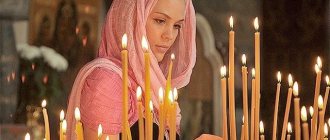Is it possible to cremate an Orthodox person? What happens to the soul? The Church's attitude towards cremation. How to bury after cremation?
Cremation is one of the most popular burial methods in the world. It is common in India, Indonesia, Japan and many other countries. The Catholic and Protestant churches tolerate the procedure of burning the dead . At the same time, clergy in Orthodoxy, Islam and Judaism deny this ritual and consider it a sin.
The procedure of modern cremation and its history. Description of famous crematoria and their features
The procedure, which is carried out using a special oven under the mandatory fulfillment of a number of conditions (tightness of the structure, maintaining the temperature at a high level - up to 1100°C), is called cremation. The word comes from the word cremare, which means “to burn.” When choosing this method of disposal of the body, you need to take into account all the features. So, gas is used for combustion, which releases a large amount of heat; it is directed by a stream of air onto the torso, since it burns longer. The total duration of the procedure is always different, depending on factors:
- body weight;
- fat content;
- physiological characteristics of a person.
Despite the high functionality of modern crematoria, they will not be able to melt some materials. Glass and metal usually help to increase the burning period, since energy is also spent on melting such elements, so they are first removed from the coffin. Pacemakers sometimes explode when burned. When the procedure is completed, solid inclusions that have not turned to dust are crushed. Large particles are then screened out anyway.
As a result, 2-3 liters of ashes remain, it is placed in a special container - an urn, inside there is a capsule containing the remains of the deceased.
In ancient times, cremation was the most popular method of burial. It was used when burying the dead in Ancient Rome and Greece. Burning bodies were floated down the river or the deceased were burned on land, and the ashes were left in certain places. The main principle behind cremation was the belief that the soul is reborn. However, the situation changed dramatically after the introduction of Christianity. Until the 18th century, such a ritual was illegal; for performing it on a loved one, one could lose one’s life.
History of the cremation ritual
The first people who began to carry out the cremation ritual were people who lived 300 BC. e. In those days, such cases were rare. However, already in 1200 BC. cremation became so common that it was used everywhere.
The people of ancient India cremated people.
According to legends, the body of Buddha was burned, and the ashes were placed in stupas and sent throughout the country.
Burning the bodies of the dead was also practiced in Ancient Greece. They believed that fire would purify the soul, which is why a person would live happily in the afterlife.
Cremation was carried out not only by the Hellenes, but also by the Romans. Afterwards they collected the ashes of the deceased and placed them in the columbarium. There were also references to cremation in the Old Testament. However, it was said that only pagans practiced it.
Today it is also possible to cremate bodies. If the ancient Greeks and Romans carried out the procedure at the stake, today there are special institutions called crematoriums. There are special ovens in which the bodies of the deceased are placed. The only exception is India, where even today the dead are burned at the stake.
Western Europeans cremated their loved ones even before Christianity spread throughout the world. In 785, cremation was prohibited because Charlemagne considered that it contradicted Christian moral standards. If a person broke the rule, he was immediately executed. Therefore, everyone preferred the disposition of corpses. It was used everywhere until the 50s of the 18th century.
In the late 60s of the 19th century, luminaries of world medicine gathered in Florence to adopt a resolution regarding the resumption of cremation. This was required to ensure people's health was maintained. It was believed that bodies that decompose in the ground provoke the development of infection.
Description of famous crematoria and their features
The operating principle of crematoria is similar in different regions. There are a total of 27 such facilities, they are located throughout Russia (in 23 cities). Information about the most famous in history:
- “Donskoy”: it had a columbarium, cells with urns were located indoors and outdoors, the crematorium began work in 1927, since then the idea of burning bodies has been actively promoted;
- Leningradsky: opened during the war, this made it possible to dispose of corpses (dead soldiers, starving people, etc.), this is how those who had no relatives were buried, and cremation also made it possible to bury unidentified corpses, bury their ashes in a mass grave;
- Novosibirsk: a modern building, this is a private crematorium, it has an unusual infrastructure, a camel lives on the territory, a dinosaur statue is installed, and clients are offered the service of sending ashes into space;
- Arkhangelsk: the construction was planned as the creation of an alternative to traditional burial; the crematorium offers numerous conditions (funeral service, farewell, civil memorial service, other rituals);
- Ekaterinburg: there are separate halls for cremation, farewell, distribution of ashes, and holding solemn and mourning events; the facility is a whole ritual complex.
Official documents issued to relatives after the procedure
After cremation, relatives can receive documents that will help in the future bury the remains if a traditional burial is chosen, or install in a columbarium cell:
- certificate of cremation: a crematorium employee presents such a document to the person responsible for the procedure performed, the certificate contains the full name of the deceased, the name of the ritual object where the procedure took place, date and time;
- certificate of non-investment: in order not to open the urn before placing it in a columbarium cell, a certificate is issued confirming that there are no foreign objects inside; this document is also provided when transporting the urn abroad.
In cases where death was preceded by illness
It is believed that fire can kill any disease or virus, however, crematoria often refuse to burn the bodies of the deceased who suffered from infectious and some other types of diseases during their lifetime. What is this connected with?
Failure can occur for several reasons. If the patient has an infection, the administration of the complexes proceeds from practical considerations: the bodies are not burned immediately after admission, they remain on the territory of the crematorium for some time, which can expose employees to infection. In the case of cancer and other diseases, it takes much longer to burn the bodies of such patients than to burn people with healthy organs and tissues. Treatment of the deceased with radio wave therapy, as well as involvement in the liquidation of nuclear power plant accidents, may also serve as grounds for refusal. It has been established that radioactive particles can lead to the destruction or damage of blast furnaces.
Cremation or burial: which is best for the soul. Attitude of the Christian Orthodox Church
The question of whether an Orthodox Christian can be cremated is controversial. If previously it was impossible to break the law and burn the body (the punishment for this is death), now the restrictions have become less stringent. There are several factors to consider that suggest opposing views on this issue:
- the body must go into the ground after death, since the physical shell of a person was created from dust, and the remains return to it, which explains the importance of performing a traditional burial;
- cremation is a pagan custom, so it should not be performed by a Christian in any case, since after the introduction of this religion many centuries ago, cremation was replaced by burial in the ground;
- the body is the earthly shell of the soul, so there is no need to become attached to it, it is enough to take care after death and show respect during burial;
- burning cannot damage the incorruptible shell, which is due to the lack of attachment to the worldly.
Considering all of the above, it will be difficult in principle to form an opinion of the Russian Orthodox Church (RCC). However, these are just different grains of a single position. Thus, during cremation, the body is burned, which does not harm the soul of a Christian.
Even if the physical shell is not buried, this does not mean that the deceased will not be able to enter the Kingdom of Heaven.
However, for a believer, the traditional method of funeral is still preferable. Priests professing the Orthodox religion explain this desire by adherence to Russian traditions. It is believed that this is a more humane method of burial, which is also saturated with biblical religion.
What to do with the ashes
Some priests approve of cremation, but on one condition: the ashes must be interred. In this way, a long-standing tradition can be partially observed. However, this opinion is not unanimous; different clergy interpret the meaning of this ritual in their own way. For example, today even storing ashes at home, scattering them in the air, or keeping them in a columbarium is no longer considered prohibited, despite the fact that these traditions came from the West.
Funeral service before cremation
To bring the soul closer to God, they use different methods: they install a cross on the grave, conduct numerous funeral rites, and also perform the funeral service for the deceased. In the modern world, it is customary to carry out such a ritual when choosing various methods of burial if a baptized person is buried. Moreover, for clergy, funeral services before cremation have also become acceptable. The priest can be invited to perform such a ceremony in the funeral hall of the crematorium or at home.
Funeral after cremation
Among the rules of burial, special attention is paid to the commemoration of the dead. Traditions require adherence to the custom after the funeral, when the coffin with the body is lowered into the ground. However, today funerals are held after cremation. The ashes of the deceased are not given to relatives immediately, but after a few days.
The funeral is held on the day of cremation (the body is burned on the third day after death), as well as immediately after the burial of the cremated remains of a relative.
Memorial day calculator
Burial of ashes in a cemetery, how the process occurs
The urn with ashes is presented to relatives in a special funeral hall accompanied by funeral music. Anyone can attend the ceremony. After receiving the ashes, relatives can use a columbarium to store them or bury the ashes in the ground, organizing a grave with a headstone as is customary during a traditional funeral. You can get rid of ashes by scattering them.
The process of burying an urn is no different from burying a body. Typically, in a cemetery, the same amount of space is allocated for a container with ashes as for a body. If desired, you can place the urn in a regular coffin and bury it that way. But this is not done often, although it is not prohibited.
The process of burying the urn
Cremation is practiced in funeral traditions in many countries around the world. This is one of the ways to dispose of a corpse. But the Orthodox religion opposes the burning of the body, which, according to Christian beliefs, is a vessel of God. Priests condemn, but do not prohibit the rite of cremation, but the question of what should be done with the body of a Christian remains very controversial. On the one hand, the urn with ashes is convenient to store (the cost of the procedure is an order of magnitude lower than a regular funeral). On the other hand, burning a body is not traditional, which is why disputes arise about whether cremation is a sin in Orthodoxy or not, how the church views the cremation of a deceased person, whether friends will condemn it (public opinion is often against this procedures).
Consequences for the living after violations of the rules of Orthodoxy
When relatives (Christian believers) decide to have cremation after the death of a loved one, they do not always think about the consequences of this action. The Church does not prohibit cremation, but does not allow it either. This means that, if possible, you should still choose a traditional burial, as the method most consistent with the customs of Christianity. A living person after cremation may feel disappointed and dissatisfied with himself, because he subjected a relative to a procedure that may harm the soul. But understanding this often does not come immediately.
As for the opinion of the church, it may allow cremation, but at the same time it will adhere to established traditions. It is believed that when burned, a person abandons his faith in the same way as he neglected the centuries-old burial traditions that have formed since ancient times.
At the same time, the famous Christian thinker Minucius Felix declares that the Lord can resurrect the deceased from the remains in any state, including ashes. Accordingly, a person still has the right to make a choice in what way to leave the earth.
Is this a sin or not according to the priests?
Cremation is officially permitted in Christianity . However, many priests are against such burial.
- Metropolitan Kirill of Smolensk does not consider cremation to be a tradition of Orthodoxy, which is characterized by the belief in the resurrection of the dead.
When the body is burned, this belief loses its meaning. Yes, if it is buried in the ground, it will decompose. But this is a gradual process, and cremation is instantaneous. To give the body to fire means to refuse the salvation that the Lord can bestow. It is also a refusal to believe in him. Therefore, cremation should be avoided if possible. - Deacon Kuraev believes that the Lord God is able to raise a person from the dead in any case, no matter how he is buried. But still, traditional funerals are more humane and humane than cremation. For the deceased, the funeral does not have any meaning, but they are not indifferent to his family and friends, who may be hurt by the very fact of destroying the body of a loved one.
- Archpriest Vladislav Tsypin believes that cremating the deceased means showing disrespect for him. But still, he clarifies that the church is not against this method of burial.
- Other priests share the same opinion - Hegumen Fedor, Patriarch of All Russia Kirill, Professor of the Theological Academy Protodeacon Andrey . They all talk about the need to treat the body of the deceased with respect, maintain faith in the saving power of the Lord, and soften the grief of loved ones by holding a traditional funeral.
Below is a video with the opinion of priests about cremation:
What is better - cremation or regular burial? Each person must answer this question himself and, if it is fundamentally important to him, indicate his decision in the will. If the death occurred suddenly, relatives should accept him.
Meeting of the Synod of the Russian Orthodox Church on cremation issues
The issue of consistency between the cremation procedure and the church was still actively discussed until recently. However, in 2005, burial rules were determined. They were received during a meeting of the Synod of the Russian Orthodox Church. Then the corresponding document “On the Christian burial of the dead” was approved. Moreover, all discussions concern only cases when baptized people are buried.
The essence of the document “On the Christian burial of the dead”
This document established several provisions that make it possible to understand how the Orthodox Church views cremation:
- the body is the temple of the soul, and therefore of God, and therefore deserves appropriate treatment;
- burial is usually carried out in a traditional way, which is more than a thousand years old; the burial of the body is associated with the resurrection of the dead;
- at the same time, the Lord can bring even a burned body back to life, which expands the possibilities when choosing a burial method;
- cremation and the Orthodox faith are still considered incompatible concepts, however, you can obtain permission to perform this rite if there are no other alternatives;
- during the funeral procession, when saying goodbye, it is necessary to pray for the deceased;
- It is highly advisable to bury the ashes.
When this measure is forced, the Orthodox Church is lenient about burning bodies
Servants of the Council of Bishops believe that cremation is not considered a method of burial for people who profess Orthodoxy. However, there are times when there are no other options. And they cannot be influenced by the relatives of the deceased. In such cases, you can invite a priest who will conduct the ritual of communion, confession and funeral service.
Muslims, Jews and Greeks are against cremation. Also, people who underwent baptism in the Greek Orthodox Church should refuse it.
Reasons for the spread of cremation on Russian soil
Today, more and more often, before a funeral, people decide which method to choose and whether it is possible to cremate an Orthodox person. This is due to the rapid growth in popularity of the body burning procedure. Reasons explaining this state of affairs:
- lack of available land (but in Russia this problem is not yet as pressing as in the West and East);
- inability to care for the grave;
- high cost of burial in the traditional way;
- many traditions are becoming obsolete and disappearing, which is partly due to urbanization.
Information site about icons, prayers, Orthodox traditions.
"Save me, God!". Thank you for visiting our website, before you start studying the information, please subscribe to our Orthodox community on Instagram, Lord, Save and Preserve † - https://www.instagram.com/spasi.gospodi/. The community has more than 49,000 subscribers.
There are many of us like-minded people and we are growing quickly, we post prayers, sayings of saints, prayer requests, and timely post useful information about holidays and Orthodox events. Subscribe. Guardian Angel to you!
Death is one of the most terrible events in the life of every person. Many people say that you can correct any mistake while you are still alive. This event brings a lot of grief to the relatives and friends of those who leave us. Different nations have their own traditions of burial rites. Christianity has also formed its own traditions. But in the modern world there are certain realities that dictate their conditions. Since the prices for traditional burial are quite high, and the number of places is not so large, the phenomenon of cremation is common. What does the church say about whether an Orthodox person can be cremated?
Question answer
Where to put the cross of the deceased?
Expert opinion
Father Pavel
Clergyman
Before cremation, all metal objects are removed: decor from the coffin and ritual attributes from the deceased. The cross symbolizes a person’s faith, his connection with God, therefore the statement that such an item cannot be worn after the deceased is a manifestation of ignorance. Nothing bad will happen if your family puts it on. A pectoral cross can also be kept at home as a memory of the deceased. Decoration of this form may well be passed on from generation to generation. But sometimes, due to prejudice, a person refuses to keep the cross, in which case it is customary to take it to the temple.
Is cremation an Orthodox tradition?
Expert opinion
Remontnikov Vladimir Petrovich
Religious scholar, historian
People are gradually forgetting the traditions formed in ancient times and introducing new customs. Among them is cremation (in the Russian Federation this is an innovation that has been advertised since the last century). However, if we look at history, it was a pagan rite, used in Ancient Rome and Greece even before the introduction of Christianity. For Christianity, this is an alien tradition, allowed for widespread implementation only recently. Until the mid-18th century, cremation was considered a sin, and such acts of relatives were considered a vice. Despite the fact that the church was opposed to cremation for a very long time, changes have occurred for some time now, and the attitude towards such a rite has become more neutral and loyal.
What conditions must be observed when cremating a person in Orthodoxy?
Expert opinion
Father Pavel
Clergyman
If you are interested in knowing why Orthodox baptized people cannot be cremated, you should turn to ancient traditions to understand the differences between these customs. Thus, during a traditional burial, it is customary to read prayers, perform funeral rites, and use ritual attributes. The coffin with the body is interred. But cremation is a simplified procedure. To carry it out, it is enough to provide conditions under which the bodies of the dead can be burned. However, the attitude of the Orthodox Church towards cremation may change, provided that the ashes are buried in the ground, and prayers are read during the farewell procedure. In addition, it is recommended to conduct a funeral service if the deceased was baptized. From the point of view of Orthodox canons, this will help the soul find peace, find its way to the afterlife even after experiencing stress - burning the body.
Has it always been forbidden in Orthodoxy to burn dead people?
Expert opinion
Remontnikov Vladimir Petrovich
Religious scholar, historian
The history of the emergence of the cremation procedure goes back to antiquity. It has nothing to do with Christianity. Moreover, this method was previously always prohibited; for performing this procedure for a long period, the death penalty was imposed. Cremation has become an acceptable norm over the past decades. But even now, the burning of the bodies of the dead is not considered one of the religious traditions of Orthodoxy, despite the loyal attitude of the Church.
Christian cross and bible
What are the consequences for the living after cremation of the dead?
Expert opinion
Father Pavel
Clergyman
When cremation is the last wish of the dying person (as specified in the will), responsibility for making the decision is removed from the family. However, there are doubts about the legality of the actions of the relatives of the deceased, who at their own discretion decide to violate the centuries-old prohibitions of the Orthodox Church and send a loved one for cremation. Today this procedure is not considered sinful. However, cremation is also not the most suitable burial option. For this reason, you should speak with a clergy member before making a decision.
Why does the Russian Orthodox Church not approve of cremation?
Expert opinion
Father Pavel
Clergyman
The view of the Russian Orthodox Church on the problem of burning a body is unequivocal: this procedure violates Orthodox canons, centuries-old Russian traditions, and when it is performed, a person denies his own faith. However, this position has lost its rigidity. Today the reaction of the Russian Orthodox Church is unequivocal - silent disapproval. Clergymen have the right to choose: they can conduct a funeral service before cremation or refuse due to personal convictions, taking into account the strength of faith.
Is cremation of a baptized person a great sin?
Expert opinion
Father Pavel
Clergyman
It is very difficult today to answer unequivocally the question about the degree of sinfulness of burning the body of an Orthodox Christian. Previously, there was only one solution: a strict ban, serious punishment for violating the law of God and the state. Today, cremation is no longer considered a sin, which is explained by the Lord’s ability to restore the body even after such a procedure. In addition, burning the body does not affect the process of the soul’s transition to another world. This means that today this method of burial is not as condemned as before.
How categorical is the Russian Orthodox Church on the issue of the permissibility of cremation?
Expert opinion
Remontnikov Vladimir Petrovich
Religious scholar, historian
Fifteen hundred years ago, burning a body was still punishable by death. The situation has changed over the past decades. So far, the Church has not fully accepted the fact of cremation as the main method of burial. However, the Russian Orthodox Church does not condemn as vehemently those who burn the remains of the dead. Sometimes this procedure is even justified by the Church: during burial in other countries where traditional burial is prohibited, during a disaster when people die in fire.
What are the reasons for the growing popularity of cremation in Russia today?
Expert opinion
Remontnikov Vladimir Petrovich
Religious scholar, historian
On the territory of the Russian Federation, unlike China, there is still enough free land for organizing traditional burials. However, there are other reasons: when relatives are not able to care for the grave because they are moving abroad; high cost of burial, if we are talking about organizing a funeral at a decent level. However, the main reason for the growing popularity of cremation is considered to be the obsolescence of traditions due to urbanization, since previously it was in the villages that customs were preserved.
Columbarium
What counterarguments could there be that would allow a person not to decide to cremate a relative?
Expert opinion
Father Pavel
Clergyman
If the dying person did not leave a statement of will, then the method of burial is chosen by his relatives. However, sometimes the situation is the opposite: it is the relatives who insist on cremation. In this case, you need to take into account some features. Thus, the will of the deceased should be taken into account. If the will specifies a specific method of burial (burning), this fact should be taken into account. In addition, it is advisable for believers to go to another world through burial in a grave. This will allow us to maintain the traditions of Orthodoxy, because even Jesus Christ was buried in a different way, not through cremation.
How can one react to the position of a person who supports cremation solely for financial reasons?
Expert opinion
Father Pavel
Clergyman
Burial in the traditional way today is a rather expensive procedure. Not everyone can afford it. When a person chooses cremation as a more affordable option, there is no negative connotation. He does not commit a sin because he did not choose this method for the purpose of earning money (saving to buy something for himself). When a person is in cramped circumstances, his choice of burial method cannot be condemned, especially since burning the body of the deceased is not condemned today.
Is it possible to cremate an Orthodox Christian after a funeral service?
Expert opinion
Father Pavel
Clergyman
Clergy can even come to the crematorium for the funeral service. This is an important Orthodox rite that helps the soul let go of the dead body and continue the transition to another world. During the funeral service, some of the deceased’s sins are also forgiven. This means that before cremation, on the contrary, performing such a ritual is very welcome. After the procedure is completed, a wake should be held, and the ashes should later be interred.
Is it possible to cremate a baptized person in Russia?
Expert opinion
Father Pavel
Clergyman
The method of burning the remains of the deceased has become widespread in the world today due to the simplicity of the procedure and the lower cost of burial. However, if a baptized person happens to die, relatives often do not know what to do. It is not yet customary in Russia to talk openly about cremation, despite the fact that this method is no longer prohibited. Burning the body of a baptized person is acceptable, but is not encouraged by the clergy.
Is cremation Christian or not?
Expert opinion
Father Pavel
Clergyman
Burning the body is a truly pagan rite. It was like that thousands of years ago, before the introduction of Christianity. This means that the ritual of cremation is not directly related to such a religion. However, today it is permissible to carry it out. This can be done without the need to hide; prohibitions on performing such a ritual are a thing of the past.
Cremation - a sin or not?
Expert opinion
Father Pavel
Clergyman
It is necessary to consider the issue of burning from the point of view of changing attitudes towards this procedure over time. Thus, cremation was previously considered a huge sin, as a pagan rite. Today it is conditionally permitted: it is not part of the Orthodox canons, but it is no longer condemned. The Russian Orthodox Church does not consider the burning of the remains of a deceased a sin, although it silently condemns it.
Do cremated people have funeral services?
Expert opinion
Father Pavel
Clergyman
It is necessary to understand the concepts. Thus, a funeral service is a ritual of preparing a believer for the transition to another world, the forgiveness of sins. Accordingly, it is customary to perform it before burial. This means that a person can only have a funeral service before cremation. After this procedure, you need to hold a wake and bury the remains.
What to do with the ashes after cremation of a person in a Christian way?
Expert opinion
Father Pavel
Clergyman
Relatives have several options: bury the ashes according to Orthodox traditions, keep them at home (but this is the least suitable way for a believer), or leave them for safekeeping in a crematorium cell. All options are conditionally acceptable, but among them there is one most acceptable. We are talking about the burial of ashes according to tradition, for which a small grave is dug, where an urn with the ashes of the deceased is placed.
Orthodoxy's attitude to cremation
Whether to cremate or bury an Orthodox Christian depends solely on the decision of the relatives or the last wish of the deceased. Currently, modern Christian denominations accept the phenomenon of cremation.
They are based on the words of an early Christian church writer that he does not see any harm in burning, but, as before, they were accustomed to burying corpses in the ground. But Orthodox clergy say that when choosing cremation or burial, you should choose the option of preserving the body in a coffin.
The answer of the Christian Church to the question why cremation cannot be done is that cremation will not give the relatives of the deceased the opportunity for consolation and prayer. Although this is also a controversial issue. It all depends on the need for this procedure. The Church does not deny this process or prohibit it; it simply tolerates such manifestations.
Brothers and sisters in Christ. We need your utmost help. We created a new Orthodox channel in Yandex Zen: Orthodox World and there are still few subscribers (20 people). For rapid development and communication of Orthodox teaching to more people, we ask you to go and subscribe to the channel . Only useful Orthodox information. Guardian Angel to you!
Attitude of other religions
The choice of burial method should be made, first of all, taking into account religion:
- cremation in Islam: Muslims are categorically against burning the body, despite the fact that this is only an indirect prohibition determined on the basis of what is written in the Koran, but believers strictly adhere to it, otherwise it is believed that the soul will not be able to resurrect when the time comes if the human body is destroyed;
- Judaism: the body after death is consigned to the earth, this is the only acceptable method of burial for people professing such a religion, since after death “dust must return to dust”;
- Buddhism, Hinduism: cremation is the most suitable method of burial, because it is believed that the body is a prison for the soul, and its burning will contribute to the transition to the next stage of development (a new incarnation).
Cremate or bury
The choice between burial in the ground and cremation remains with the deceased person or his relatives, if the last will has not been announced. Orthodox Christians mostly choose the first option. This allows everyone to accompany the deceased to the grave, preserving old customs and traditions (funeral procession, laying wreaths on the grave, a special way of tying coffins, funeral service, visiting the cemetery on Remembrance Day).
If burial is illegal or impossible because relatives do not have money for a funeral, the situation should not be aggravated. Cremation in the Orthodox religion is not considered a reason for excommunication. It is impossible to speak badly and condemn a person who cremated his relative.
This can be allowed, become the only way out that the Church will not condemn. The deceased does not care; the soul loses contact with the body. After the Last Judgment, God will resurrect all the worthy, including those whose bodies were burned. This is emphasized by many prominent representatives of the Russian Orthodox Church. However, there is no single correct solution. The Church does not agree with cremation, but it cannot.
Is it possible to cremate an Orthodox person: a question for the priest
Father Vladimir
Clergyman
The Russian Orthodox Church disapproves of the burning method. However, there are no longer strict prohibitions; every person, including believers, can independently decide which method of burial to choose. The clergy explain why it is better to give preference to traditional burial - this is a way to return to the ashes, according to the Holy Scriptures, and also to observe centuries-old traditions. In addition, choosing this burial method is tantamount to denying one’s own faith, since before the introduction of Christianity, burning the body was part of the pagan tradition.
Foreign objects
In addition to radioactive radiation, damage to the equipment of the cremation complex can be caused by foreign objects located in the bodies of the deceased. Most often these include:
- cardiac stimulants;
- implants (including silicone)
- defibrillators;
- hearing devices;
- clock mechanisms;
- lighters;
- gas cartridges;
- objects made of glass and metal;
- containers containing alcohol;
- coffin decorations - medallions, flower arrangements.
An important step when signing a cremation agreement is to confirm the absence of any of the listed objects in the coffin. The exception is dentures and implants made of precious metals.










